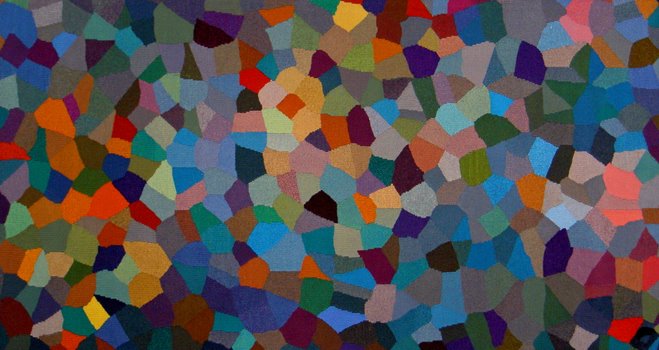Linda Needles, the manager of the Community Threads project recently sent me these images of the last 2 squares to completed on the banners. The weavers include many textures and creative approaches.
A new term of weaving classes has begun, and the first thing that struck was how happy and enthusiastic as well as loud and boisterous students have been in the class, communicated by the volume at which they spoke, at times making it difficult for me to be heard and to teach. I wondered if I was a good teacher at this point, thinking that I had lost complete control over my class! LOL! So questioning my own competency I started reading some research about creating good learning environments and I came upon “Constructivist Learning Environments” by Brent G. Wilson and what I learned is that this is all a very good sign!
Another square completed for the Community Threads project. I was baffled at first as to what I was looking at and Linda Needles told me its someone looking through a camera lens and sees a bird! How original!
I was very relieved to hear what he had to say and what he considered to be good learning environments . The role of the teacher in his view is one where lerning is fostered and supported, but not controlled or dictated in any strict fashion. He talks about the difference between ‘instructional environments’ and ‘learning environments’. ... a learning environment is one in which learning is fostered and supported, as opposed to an instructional environment, that is a more controlled and directive of the students activities and interactions. To someone observing the class, a ‘learning environment’ appears chaotic (which it certainly does in our class!), however this only indicates that the environment is dynamic, responsive and vibrant. This approach sees the student taking more initiative in their learning and leaving the teacher to take a back seat, perhaps guiding, advising and encouraging rather than being directive. The teacher is responsive to each individual student as they work at their own rhythm and decide individually what direction they want to take and what kind of challenges they are ready to take on.
Kate Kitchen with her recently completed tapestry.
The idea of creating a ‘learning community’ is definitely what is happening in our classroom at the Toronto Weaving School, where students are eager to help each other on projects and inspire others with the projects they have done. The students support each others learning constantly...it’s a real environment of cooperation and caring. Thus creating a good ‘learning environment’ is one in which learners have at their disposal the tools, equipment, and resources that are complemented by the impact other people in the learning environment have upon each other. So I guess I am now convinced that I have intuitively created an optimum learning environment for weaving, thanks to you and your lively participation. In all of this I only ask that you not forget and include the newcomers to the class .....
Agota Dolinay sent me this photo of her (on the left) beside Maximo Laura, Mai Liis Toome and Ellen Allas who are presently in Peru for a total of 3 weeks. What a great adventure. Give Maximo our regards!
Lynn Mayne from the American Tapestry Alliance writes:
Traveling south from Michigan this week gave me the opportunity to
visit “Outside The Line,” ATA’s Small Tapestry International 3 in
Troy, Ohio. This second venue of the show is just six miles off I75
in a landmark mansion on the main street which has been converted into
a cultural center owned by the city.
The show is up a wide staircase on the second floor on beige fabric-
covered walls. I enjoyed seeing these actual works which in many
cases were even more impressive than their images in the exhibition’s
catalog. The dimension and color of the catalog cover tapestry,
“Colorin” Books" by Sharon Crary was striking. Margo Macdonald’s
“Ebey’s Prairie” was made even more beautiful by the paper collage
mounting which doesn’t show up in the catalog picture. Similarly, I
could really appreciate the delicacy of Dorothy Clews’ “The Space
Between” by seeing it in person. “Beyond the Line - A Sense of
Injustice” by Suzanne Fitzgerald was arresting and Joyce Hayes’ “Etude
4” just shimmered.
This upstairs space could have used more tapestries and would have
been better if the eight small and 3D pieces would have been
positioned with the others instead of being enclosed in a big display
cabinet on the first floor. The exhibit coordinator told me that this
show met the center’s requirement for a traveling show, especially
since it is an international one.
I also want to encourage anyone who can to visit The Folk Art Center
in Asheville, NC for the Tapestry Weavers South show, “ The Beat Goes
On.” This is a beautiful big show with 49 tapestries in a high-
ceilinged gallery. The exhibition will be on display until January
12, 2014.
Tapestry Opening Reception: Community Threads
October 27 2-5pm
Gibson Centre
63 Tupper Street West
Alliston Ontario
The exhibition is on until November 5. Contact Linda Needles at lneedles@gmail.com for more info.








1 comment:
Wall art is one of the most important aspects of a beautifully crafted space. That being said, we know that buying good art takes a lot of time and money. For this reason, we’ve created Wall26™ - the online hub for high quality and affordable art. palm tapestry
Post a Comment